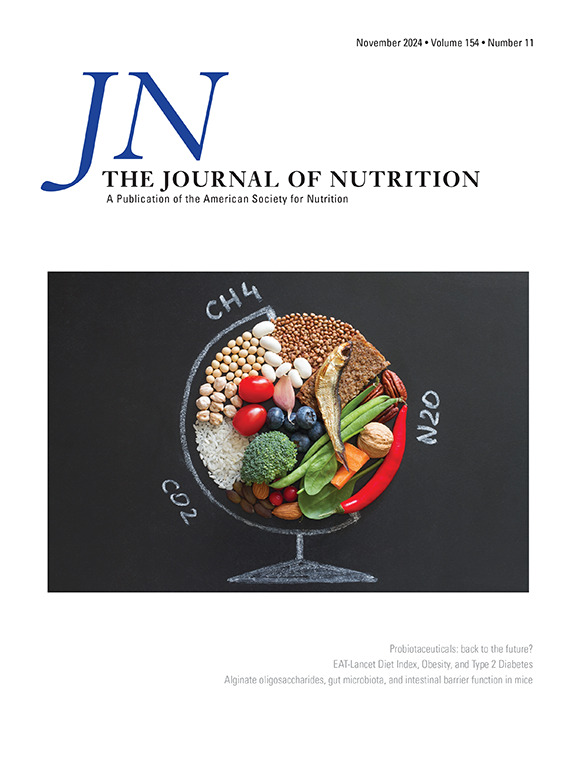每日饮用含有副干酪乳杆菌Shirota (LcS)的发酵乳对美国成人硬便或块状便的粪便一致性的影响:一项随机对照试验。
IF 3.7
3区 医学
Q2 NUTRITION & DIETETICS
引用次数: 0
摘要
背景:副酸乳杆菌 Shirota 株(LcS)对某些肠道不适(如便秘)人群的大便稠度有好处,但在美国人群中的数据却很有限:本研究评估了 LcS 对大便硬结(HLS)的影响:在这项随机、对照、开放标签研究中,50 名参与者(41 名女性,9 名男性)在 14 天的磨合期内有≥25% 的排便(BM)出现硬结便,他们被随机分配到含有 8.0x109 菌落总数形成单位 LcS/mL 的 80 mL 发酵牛奶中,接受 28 天的干预(积极组)或不干预(对照组),然后接受 14 天的干预后观察。每天使用新型智能手机应用程序记录排便习惯。主要终点是在 28 天的干预期间,使用布里斯托粪便形式量表对排便进行评分的参与者中,有≥25% 的人出现 HLS。次要终点包括出现 HLS 的便意频率比基线降低、大便次数、拉稀、排空不完全、人工智能衍生的粪便图像评分以及患者便秘生活质量评估(PAC-QOL)评分:积极组显示,排便次数≥25%的便秘患者比例明显降低(几率比 0.34,95% CI 0.14 - 0.80,p=0.014),排便次数减少的便秘患者比例也比基线组高(几率比 2.86,95% CI 1.03-7.92,p=0.043)。积极组的 PAC-QOL 总分也有积极改善(p=0.003):结论:每日饮用含有 LcS 的发酵牛奶可显著减轻便秘症状,改善美国成年人的 QOL,这些成年人普遍身体健康,有间歇性便秘史。该干预措施的耐受性良好,没有出现与该产品相关的严重不良事件,这表明其安全性以及作为控制便秘的饮食策略的潜力:本研究已在 ClinicalTrials.gov 登记为 NCT06014008,网址为 https://clinicaltrials.gov/study/NCT06014008。本文章由计算机程序翻译,如有差异,请以英文原文为准。
Effect of Daily Consumption of a Fermented Milk Containing Lacticaseibacillus paracasei Strain Shirota (LcS) on Stool Consistency in United States Adults with Hard or Lumpy Stools: A Randomized Controlled Trial
Background
Lacticaseibacillus paracasei strain Shirota (LcS) has shown benefits for stool consistency in populations with certain bowel complaints (e.g., constipation), but data in a United States population are limited.
Objectives
This study evaluated the effects of LcS on hard or lumpy stools (HLS) in an otherwise healthy population that generally represents the United States adult demographic.
Methods
In this randomized, controlled, open-label study, 50 participants (41 females, 9 males) with HLS in ≥25% of bowel movements (BMs) during a 14-d run-in period were randomly assigned to receive either 80 mL fermented milk containing 8.0 × 109 colony forming units LcS/mL for 28 d (active group) or no intervention (control group) followed by a 14-d postintervention period. Bowel habits were recorded daily using a novel smartphone application. The primary endpoint was the presence of HLS in ≥25% of the participant-rated BMs using the Bristol Stool Form Scale over the 28-d intervention. Secondary endpoints included the presence of reduced frequency of BMs with HLS from baseline, stool frequency, straining, incomplete evacuation, artificial intelligence-derived stool image scores, and Patient Assessment of Constipation Quality of Life (PAC-QOL) scores.
Results
The active group showed a significantly lower proportion of participants with HLS in ≥25% of BMs [odds ratio: 0.34; 95% confidence interval (CI): 0.14, 0.80; P = 0.014] along with a higher proportion of participants with a reduced frequency of BMs with HLS from baseline (odds ratio: 2.86; 95% CI: 1.03, 7.92; P = 0.043). The active group also demonstrated positive improvements in total PAC-QOL scores (P = 0.003).
Conclusions
Daily consumption of LcS-containing fermented milk significantly reduced constipation symptoms and improved quality of life in an otherwise generally healthy United States adult population with a history of intermittent BMs producing HLS. The intervention was well tolerated, with no serious adverse events related to the product, suggesting its safety and potential as a dietary strategy for managing constipation.
Trial registration number
This trial was registered at clinicaltrials.gov as NCT06014008 (https://clinicaltrials.gov/study/NCT06014008).
求助全文
通过发布文献求助,成功后即可免费获取论文全文。
去求助
来源期刊

Journal of Nutrition
医学-营养学
CiteScore
7.60
自引率
4.80%
发文量
260
审稿时长
39 days
期刊介绍:
The Journal of Nutrition (JN/J Nutr) publishes peer-reviewed original research papers covering all aspects of experimental nutrition in humans and other animal species; special articles such as reviews and biographies of prominent nutrition scientists; and issues, opinions, and commentaries on controversial issues in nutrition. Supplements are frequently published to provide extended discussion of topics of special interest.
 求助内容:
求助内容: 应助结果提醒方式:
应助结果提醒方式:


